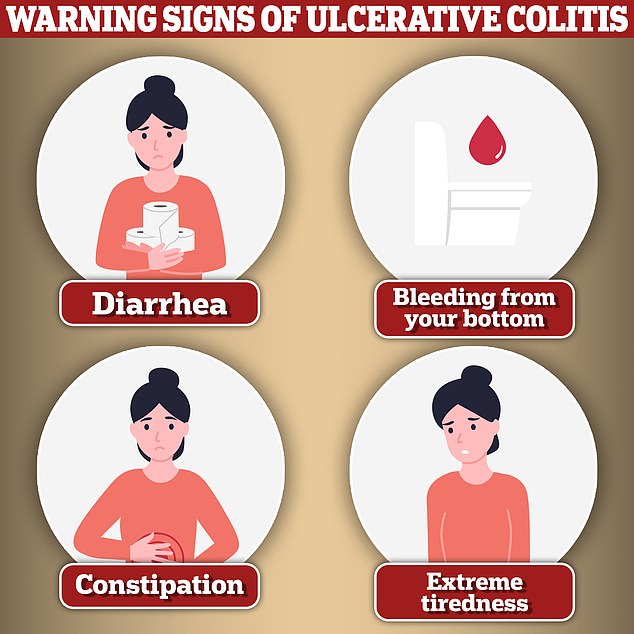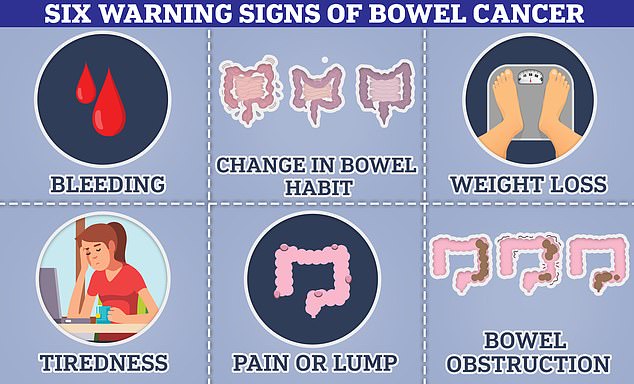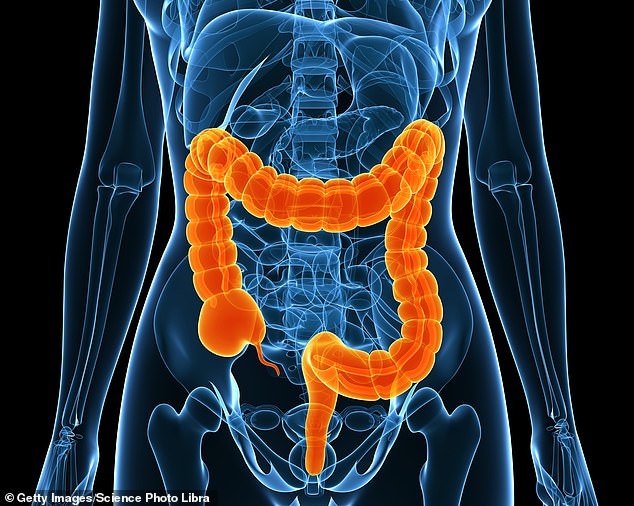Love Island star Toni Laites is known for her brash and honest opinions on fellow cast mates.
But beneath the hard exterior, she is battling a devastating condition that puts her at risk of deadly bowel cancer.
The 24-year-old from Connecticut in the US, who has seen a rocky romance with co-star Harrison Solomon, was diagnosed with chronic bowel disease ulcerative colitis back in 2017.
The disease, which involves severe and painful inflammation in the gut, saw the Las Vegas-based waitress spend the day of her prom in hospital for an emergency blood transfusion in order to save her life.
Now, she’s appearing on the show in order to ‘show viewers that not all illness are visible, but they don’t have to hold you back,’ she said in a recent interview with ITV.
Common symptoms of the condition, which affects around 300,000 people in the UK, include debilitating diarrhoea, abdominal pain, extreme tiredness, loss of appetite and weight loss.
Symptoms can also worsen and affect other parts of the body causing fat to swell under the skin, painful joints and even weakened bones.
Most concerningly, patients also have an increased risk of bowel cancer, with the risk becoming more severe the longer a patient has lived with the disease.

Antonia Laites (pictured), a pool girl from Las Vegas, previously made headlines before entering the show as she spoke out about her ongoing health battle

The severity of symptoms can vary depending on how much of the rectum and colon is inflamed. For some people, it can have a significant impact on their daily lives, the NHS says
Living with the condition for 30 years can increase the risk of bowel cancer by 18 per cent, according to studies.
Around 32,000 cases of bowel cancer are diagnosed every year in the UK, with rates of the deadly disease surging in under 50s.
Before entering the Love Island villa, Ms Laites, who goes by Toni, admitted that she made headlines in local newspapers at 17-years-old after opening up about her condition.
She told ITV: ‘I had to go to hospital the same week as my senior prom for an emergency blood transfusion.
‘Nothing that exciting happens in Connecticut, so it was a big deal and a few articles were written about me.’
While Ms Laites didn’t say why she needed the transfusion, colitis patients are at an increased risk of developing anemia—a severe deficiency of iron in the blood that can cause life-threatening problems.
This happens due to inflammation in the large intestine that can prevent the body from absorbing iron properly, as well as internal bleeding caused by the disease.
A blood transfusion is the most common treatment for severe anemia.

Toni said that she hopes going on the show will prove to people that whilst not all illnesses are visible

Bowel cancer can cause blood in the stool, a change in bowel habits and abdominal pain. Often people with ulcerative colitis don’t realise they have the disease due to the overlap in symptoms
According to the UK Crohn’s and Colitis UK charity, the disease is most often diagnosed in people aged between 15 and 25.
While the condition cannot be cured, treatment can help relieve symptoms during a flare-up and prevent symptoms from returning.
This can be achieved through drug treatments, but in some cases surgery—which involves removing some or all of the bowel.
This involves the small intestine being diverted out of an opening in the abdomen known as a stoma.
This surgery can also be used to aid recovery following the removal of any cancerous cells from the bowel.
Ms Laites’ story comes amid a surge in bowel cancer cases in young people—many of who are perfectly fit and healthy.
While research is yet to identify a specific smoking gun, groups of scientists have posed a variety of theories, including rising obesity levels, poor diets and microplastic pollution.
Common symptoms of the disease include needing to go to the toilet with more urgency, rectal bleeding, blood in the stool—which may appear red or black in colour—and change in consistency.

Scientists have now developed a tablet that could eliminate distressing symptoms for patients with severe bowel diseases like ulcerative colitis
Some patients may also experience abdominal pain, bloating and unexplained weight loss.
According to the NHS, many ulcerative colitis sufferers are often unaware they also have bowel cancer, as the initial symptoms are very similar.
However, people with the condition will be offered regular check-ups to look for tell-tale signs of bowel cancer, helping doctors diagnose the disease early.
Overall, just over half of bowel cancer patients are expected to be alive ten years after their diagnosis, with 90 per cent of people diagnosed at stage 1 surviving for at least five years.
It comes as ulcerative colitis patients are set to benefit from a new drug that can eliminate debilitating symptoms in just three months
The once-a-month jab deliver a drug that binds to immune cells that cause the damage, significantly reducing symptoms.
Earlier this month, the drug safety watchdog, the Medicines and Healthcare products Regulatory Agency, gave the green light for guselkumab to be prescribed in the UK to patients who have failed to respond to other treatments.












